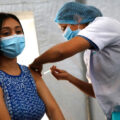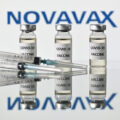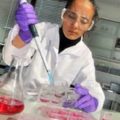
Coronavirus disease (COVID-19) is an infectious disease caused by a newly discovered coronavirus. Since the World Health Organization (WHO) declared the COVID-19 outbreak a pandemic back in March 2020, the virus has claimed around 3 million lives globally. The pandemic has impacted almost every corner of life, causing global economies to stall, changing the way we work and interact with our loved ones, and stretching healthcare systems to the limit. Governments around the world have been forced to implement harsh restrictions on human activity to curb the spread of the virus.
COVID-19 vaccination is now offering a way to transition out of this phase of the pandemic. Without them, many scientists believe that natural herd immunity would not have been sufficient to restore society to its normal status quo and that it would have resulted in an extreme fatality. A COVID-19 vaccine can prevent you from getting COVID-19 or from becoming seriously ill or dying due to COVID-19. However, some question the efficacy of these vaccines, especially given the emergence of new strains of the virus and various cases of reported side effects have raised concerns. Vaccines must be safe and effective at significantly reducing the spread of the virus for them to be successful.
How do the different types of COVID-19 vaccines work?
Each COVID-19 vaccine causes the immune system to create antibodies to fight COVID-19. COVID-19 vaccines make use of a spikelike structure on the surface of the COVID-19 virus called an S protein. The S protein helps the COVID-19 virus get inside your cells and start an infection.
The main types of COVID-19 vaccines currently available or being studied include:
Messenger RNA (mRNA) vaccine. This type of vaccine uses genetically engineered mRNA to give your cells instructions on how to make the S protein found on the surface of the COVID-19 virus. After vaccination, your immune cells begin making the S protein pieces and displaying them on cell surfaces. This causes your body to create antibodies. If you later become infected with the COVID-19 virus, these antibodies will fight the virus.
After delivering instructions, the mRNA is immediately broken down. It never enters the nucleus of your cells, where your DNA is kept. Both the Pfizer-BioNTech and the Moderna COVID-19 vaccines use mRNA.
Vector vaccine. In this type of vaccine, genetic material from the COVID-19 virus is placed in a modified version of a different virus (viral vector). When the viral vector gets into your cells, it delivers genetic material from the COVID-19 virus that gives your cells instructions to make copies of the S protein. Once your cells display the S proteins on their surfaces, your immune system responds by creating antibodies and defensive white blood cells. If you later become infected with the COVID-19 virus, the antibodies will fight the virus.
Viral vector vaccines can’t cause you to become infected with the COVID-19 virus or the viral vector virus. Also, the genetic material that’s delivered doesn’t become part of your DNA. The Janssen/Johnson & Johnson COVID-19 vaccine is a vector vaccine. AstraZeneca and the University of Oxford also have a vector COVID-19 vaccine.
Protein subunit vaccine. Subunit vaccines include only the parts of a virus that best stimulate your immune system. This type of COVID-19 vaccine contains harmless S proteins. Once your immune system recognizes the S proteins, it creates antibodies and defensive white blood cells. If you later become infected with the COVID-19 virus, the antibodies will fight the virus.
Pros And Cons Of Getting The COVID-19 Vaccine
Vaccines will play a major role in ending the COVID-19 pandemic. COVID-19 vaccines have already been proven highly effective at preventing severe illness, hospitalization, and death. The following are the advantages of getting vaccinated:
The vaccine reduces your risk of infection. Once you receive your first shot, your body begins producing antibodies to the coronavirus. These antibodies help your immune system fight the virus if you happen to be exposed, so it reduces your chance of getting the disease. There are three vaccines authorized for use in the United States, and they are all more than 70% effective in preventing infection. Learn more about effectiveness.
It’s true that you can still become infected after being vaccinated, but once more of the population is vaccinated, those chances are further reduced, thanks to something called herd immunity. So, getting vaccinated not only reduces your chance of being infected but also contributes to community protection, reducing the likelihood of virus transmission.
The vaccine can help your unborn baby or newborn. A new study found that expectant mothers who receive the COVID-19 vaccine create antibodies to the virus and pass those to their unborn babies through the placenta. Mothers were also shown to pass antibodies to their newborns through breast milk. This suggests those newborns have some immunity to the virus, which is especially important as young children cannot get the vaccine. Learn more about vaccine considerations for pregnant and nursing women.
The vaccine protects against severe illness. During studies, the three authorized vaccines have shown to be effective at preventing severe illness from COVID-19. So even if you were vaccinated and become infected, you are very unlikely to become severely ill. The clinical trials for the Pfizer-BioNTech and Moderna vaccines showed they were 100% effective at preventing severe illness. The Johnson & Johnson vaccine showed 85% effectiveness against severe illness.
Studies have shown that vaccinated people who do get infected have mild to moderate cases of COVID-19 compared to those who aren’t vaccinated. So, your risk of hospitalization and death because of COVID-19 is nearly eliminated once you are fully vaccinated.
The vaccine (eventually) will help us ditch the masks. The vaccine is the final step in our effort to get back to a more normal way of life. Public health measures such as mask wearing, physical distancing, and hand-washing were implemented to slow the spread of the virus, and they have proven to work. We should continue with these precautions until enough people are immunized, especially the most vulnerable in our community.
The vaccine will help you reconnect with friends and family. Once you’ve received the vaccine and waited the recommended time for your body to build immunity, you can visit in person with other people who have been vaccinated or those at low risk of infection without wearing a mask. This is the first step in re-establishing those in-person connections that are so important in our lives. Also, if you’ve been around someone who has tested positive for COVID-19, you do not need to quarantine if you are fully vaccinated and not experiencing symptoms. READ: Common COVID-19 Vaccine Administration Errors
Disadvantages And Challenges Associated with COVID-19 Vaccines
According to a report by the BBC, three “extremely rare” deaths in Scotland have been linked to adverse effects from Covid-19 vaccines. National Records of Scotland (NRS) said the effects had been recorded as the “underlying cause” in each of the three deaths, which were before 30 April 2021. The Oxford-AstraZeneca vaccine was linked to cases of blood clots which resulted in the deaths.
Similarly, in April 2021, the Johnson & Johnson vaccine was paused while the FDA and the Centers for Disease Control and Prevention (CDC) investigated a small number of cases of rare blood clots in people who had received that vaccine. Nearly all reports of this problem have been in adult women younger than age 50. After careful review, the FDA and CDC recommended that the administration of the J&J COVID-19 vaccine could safely resume.
Beyond the issues regarding safety, there are also problems related to side effects. People have reported side effects such as pain or swelling where they got the vaccine, fever, muscle aches, chills, fatigue, headaches, or a combination of these symptoms.COVID-19 vaccine side effects usually last about a day or two.
Conclusion
Safe and effective vaccines are making a significant contribution to preventing severe disease and death from COVID-19. As vaccines are rolling out and immunity is building, it is important to continue to follow all of the recommended measures that reduce the spread of the virus. This includes physically distancing yourself from others; wearing a mask, especially in crowded and poorly ventilated settings; cleaning your hands frequently; covering any cough or sneeze in your bent elbow, and opening windows when indoors. ALSO SEE: How to Spot Fake COVID-19 Vaccine Vs Real





